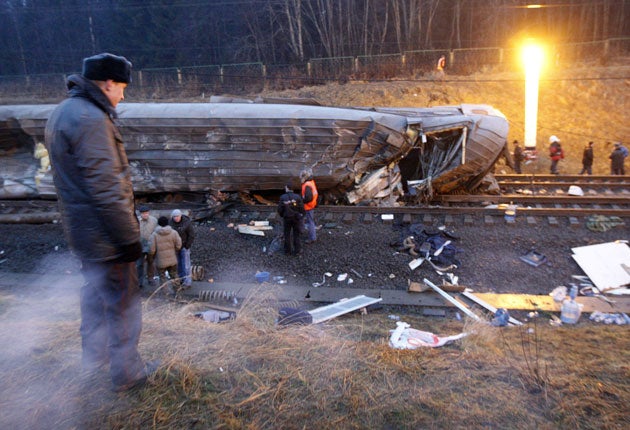Home-made bomb derails Russian express, killing 26
Death toll expected to rise, as police search for men who planted device on Moscow-St Petersburg track

Your support helps us to tell the story
From reproductive rights to climate change to Big Tech, The Independent is on the ground when the story is developing. Whether it's investigating the financials of Elon Musk's pro-Trump PAC or producing our latest documentary, 'The A Word', which shines a light on the American women fighting for reproductive rights, we know how important it is to parse out the facts from the messaging.
At such a critical moment in US history, we need reporters on the ground. Your donation allows us to keep sending journalists to speak to both sides of the story.
The Independent is trusted by Americans across the entire political spectrum. And unlike many other quality news outlets, we choose not to lock Americans out of our reporting and analysis with paywalls. We believe quality journalism should be available to everyone, paid for by those who can afford it.
Your support makes all the difference.A home-made bomb is believed to have caused the derailment of the Nevsky Express train between Moscow and St Petersburg on Friday night that killed at least 26 people, and injured more than 100, many of them seriously. The death toll is expected to rise to around 40.
The bomb blew a five-foot crater in the tracks as the train passed at a speed of up to 130mph, detaching and overturning the three rear carriages.
The head of Russia's FSB security service said that the bomb was equivalent to 15lbs of TNT, and a spokesman for the Investigative Committee confirmed that traces of the device had been found at the site.
A second bomb partially exploded at the crash site yesterday afternoon as railway workers cleared the debris, according to Russian Railways chief Vladimir Yakunin.
A criminal investigation has begun, with Interior Ministry personnel searching for suspects hiding in nearby villages. One was thought to be a red-haired man aged about 40.
The 14-car train, packed with more than 650 passengers, was speeding through forests when the disaster happened late on Friday, 250 miles northwest of Moscow and 150 miles southeast of St Petersburg. The train lights went out and it screeched to a halt.
Passengers told Russian media of carnage in the final three carriages. People had been "shaken up like a box of matches", said one passenger from the front of the train who had gone back to help in the rescue. "In the last carriage people and seats were thrown together and entangled; there were horrible injuries." One woman, Yekaterina Ivanova, said she was trapped for four hours as rescuers sought to free her. Injured passengers huddled around fires as they waited to be taken to local hospitals, which struggled to cope with the load. All but the most critical were removed yesterday to hospitals in St Petersburg or Moscow.
The line between the two cities is the busiest in Russia, with dozens of trains a day making the trip, many of them overnight. The Nevsky Express is a fast, premium train, making the journey in four and a half hours, and on a Friday evening would have been mainly filled with business travellers returning to St Petersburg. These trains are the fastest and most expensive in Russia, and the pride of Russian Railways. In just two weeks' time, a ceremonial launch was planned for a new, super-fast train on this route.
As far as terrorism goes, the most likely perpetrators would be Islamic rebels linked to the Chechen separatist movement, although authorities are refusing to speculate and no group has yet claimed responsibility for the attack. In August, a Chechen rebel website published a letter from a group claiming links to separatist leader Doku Umarov, stating that groups of fighters had been dispatched across Russia to target power stations, oil pipelines, and other key infrastructure as part of an "economic war".
A bomb blast on the same line derailed a train in 2007, injuring 27, and a court case into that is in progress. But this would be the first fatal act of terrorism in Russia outside the North Caucasus for years. Murders, hostage-takings and bombs are frequent in Chechnya and neighbouring territories, but the last time rebels struck a fatal blow outside the region was in 2004. Then, two planes leaving Moscow were blown up by suicide bombers, while another blew himself up on a crowded metro train. Russians will hope this attack, if a Chechen link is confirmed, does not signal the start of a renewed campaign of terror aimed at the country's very heartland.
Join our commenting forum
Join thought-provoking conversations, follow other Independent readers and see their replies
Comments